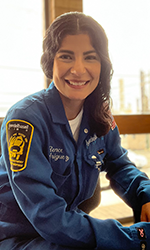A multi-part series celebrating some of the female refiners and vendors who work in our industry
“I never felt alone supporting a refinery.”

Here’s a fun fact about Renee Rodriguez– she apparently doesn’t need sleep. In addition to her full-time job, she somehow still finds the time to give back to her community in a myriad of ways. She serves as a member of The Junior League of Houston, and as a certified CPR instructor, she teaches free weekly classes to the community.
She also volunteers on the LyondellBasell (LYB) Houston Refinery’s Emergency Response Team. She is assigned to the fire, rescue, and spill team. “It has been a phenomenal opportunity and I’ve learned how to slow down even in the most stressful situations,” she says.
She enjoys the performing arts, sporting events, and travel, and she tries to attend one Formula 1 race a year. She loves cooking and testing out recipes from different cuisines. And she also takes golf lessons and volunteers at the Houston Open every year. (See what we mean about the sleep thing?)
Renee is Texas-born and bred, through and through. In fact, she has never lived outside of the Lonestar State. She was born and raised in El Paso, moving to Austin for college, where she majored in chemical engineering at UT Austin. From there she lived in Corpus Christi for a few years, and then finally settled in Houston, where she currently works as the Senior Process Engineer at the LYB Houston Refinery.
Prior to moving to the refining side of things, Renee supported the olefins units in Corpus Christi and Channelview. Lyondell has a great professional development program in which it rotates young engineers around to different sites and technologies to help them gain valuable insight and training in those critical first years of their career. Renee wanted a challenge for her final rotation as part of this program, and a colleague at an olefins site thought she would be a great fit for the refinery.
Five years later, she is still there and still enjoying the challenge. During this time, she has supported multiple areas in the unit, including the lubes unit, sitewide utilities, and cokers. Her current assignment is in the hydrotreating area of the refinery, where she supports the day-to-day operations of the diesel and cat feed hydrotreaters at the refinery. This includes troubleshooting, optimization, and process safety management. She also optimizes the catalyst life with outside vendors and helps coordinate outages in her units. As Renee’s career has progressed, she has also served as a mentor to newer employees, especially younger engineers.
“I think this industry is so resilient and there is so much information sharing that goes on between plants and companies. The refining network is strong but it is always willing to take in and mentor newcomers. I never feel alone supporting a refinery,” she says.
While she has a deep admiration for the refining industry, Renee would like to see it do a better job of attracting and retaining talent.
“There is an ongoing amount of brain-drain happening in our industry, and there are so many competitive fields that are actively luring talent,” she says. “Our industry needs to continue to operate for the current needs of society, but also evaluate what our industry and workforce will look like in the next 10 – 20 years.”
And looking forward into the future, Renee is excited about what changes she sees coming down the pipeline– not just at her refinery but within the industry as a whole. She mentions the challenges the past few years have presented to the oil and gas field. Many refineries (including Lyondell) have been in operation for a century or more and are now, for the first time, looking at new ways of doing things to address environmental concerns, the world economy, and other pressing factors. “Refineries are in the process of transforming their technology and my site is determining what new technologies can better fit a sustainable future,” Renee says.
Like many other refineries, Renee’s plant is trying to move toward a carbon neutral future. Hydrotreating, especially, has so many options to achieve this: sustainable aviation fuel (SAF), renewable diesel, etc. “Our industry is rising to the occasion of meeting sustainability goals at a rapid pace,” she says.
As a woman in a male-dominated field, Renee has experienced her fair share of obstacles in the workplace. And according to her, one of the main challenges she faces is of her own devising: imposter syndrome, a feeling that many women in the workforce can relate to.
“Women tend to be overly self-critical (‘was I too nice, was I too blunt, etc.’) and we often do not take the time to appreciate our achievements,” she says. “It is harder when there is a smaller network of females to lean on. Women need to celebrate their achievements and those of other women and know that we have a place in our industry.”
Renee is certainly breaking barriers as a female refiner doing the type of work that is typically performed by men, and she views this as both an advantage and a disadvantage. “It is an advantage in the sense that you are shattering glass ceilings for future females in your industry,” she says. “But this can also be a disadvantage because you have to have the courage and determination to break that glass ceiling.”
Watch Renee talk about RefComm in this video.
- Connect with Renee on LinkedIn
- Read our last Women In Refining article.
- If you would like to be featured in this series, please contact Lindsay.








I love your program and enthusiasm! Wow! Amazing energy as well!